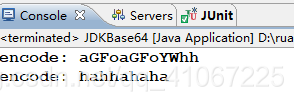**Java實現Base64加密**
阿新 • • 發佈:2018-11-03
package com.beiruan.test; import org.apache.commons.codec.binary.Base64; import sun.misc.BASE64Decoder; import sun.misc.BASE64Encoder; public class JDKBase64 { private static String src=“hahhahaha”; public static void main(String[] args) { //base64(); //commomBase64(); bouncyBase64(); } //系統自帶 public static void base64() { try { BASE64Encoder encoder = new BASE64Encoder(); String encode = encoder.encode(src.getBytes()); System.out.println("encode: "+encode); BASE64Decoder decoder = new BASE64Decoder(); System.out.println("decoder: "+new String(decoder.decodeBuffer(encode))); } catch (Exception e) { e.printStackTrace(); } } //匯入的第三方包:commons-codec-1.11.jar public static void commomBase64(){ byte[] encodeBytes = Base64.encodeBase64(src.getBytes()); System.out.println("encode: "+new String(encodeBytes)); byte[] decodeBytes = Base64.decodeBase64(encodeBytes); System.out.println("encode: "+new String(decodeBytes)); } //匯入的第三方包:bcprov-jdk15on-1.57.jar public static void bouncyBase64(){ byte[] encodeBytes = org.bouncycastle.util.encoders.Base64.encode(src.getBytes()); System.out.println("encode: "+new String(encodeBytes)); byte[] decodeBytes = org.bouncycastle.util.encoders.Base64.decode(encodeBytes); System.out.println("encode: "+new String(decodeBytes)); } }
三種方式的執行結果都如下所示:

